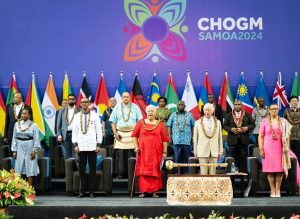As the 2024 Commonwealth Heads of Government Meeting (CHOGM) ended on Saturday, October 26, in Samoa, calls for a global plan for a fast, fair, and financed phase-out of fossil fuel production continue to escalate.

During the meeting, eight Small Island states who have called for the negotiation of a Fossil Fuel Non-Proliferation Treaty launched a new report titled “Uncommon Wealth: Fossil Fuel Expansion in the Commonwealth Dominated by Three Wealthy Countries”.
The report reveals the imbalance in fossil fuel extraction across the Commonwealth, highlighting the dominance of three wealthy nations – Australia, Canada, and the United Kingdom – in driving fossil fuel expansion and emissions. Despite representing only 6% of the Commonwealth’s population, Australia, Canada, and the UK are responsible for over 60% of emissions generated from extraction across Commonwealth countries since 1990.
In a speech during a press conference, Tuvalu’s Prime Minister, Feleti Teo, said: “To put it plainly – it is a death sentence for us if larger nations continue to open new fossil fuel projects. As a Commonwealth family, we have a moral responsibility to uphold the commitments we made under the Paris Agreement, and work toward limiting global warming to 1.5 degrees. But if we are to achieve this, we must work collectively. We cannot achieve this if our wealthier partners do not align their actions with their stated commitments. The continued expansion of fossil fuels only fans the flames of the climate crisis, directly contradicting the values we share in our Commonwealth Charter.”
At CHOGM 2024, Commonwealth Heads of Government have selected the Shirley Ayorkor Botchwey, currently the Minister for Foreign Affairs and Regional Integration of Ghana, as the incoming Secretary-General of the Commonwealth. The demand for the incoming Commonwealth Secretary-General is that she must champion greater international cooperation across the Commonwealth on the need for a fast, fair and financed transition away from fossil fuel extraction.
In particular, the Commonwealth’s majority low- and middle-income countries require support to transition as they face insurmountable debt exacerbated by colonial legacies and climate-induced losses. Without adequate financial support and debt alleviation from wealthier member states, these nations will struggle to fund climate resilience and a just energy transition.
In the final official communique, following increased pressure from Caribbean nations, Commonwealth leaders recognised the urgent need for meaningful discussions on reparatory justice for the transatlantic slave trade and its lasting impacts. This commitment signals a pivotal step forward, with heads of government pledging to support initiatives that address these historical harms.
Gillian Cooper, Political Director at the Fossil Fuel Non-Proliferation Treaty Initiative, said: “As we confront the ongoing impacts of climate change, we must recognize the historical injustices that have contributed to the vulnerabilities faced by many nations today. The call for reparations stemming from the transatlantic slave trade is intrinsically linked to our fight against expansion of fossil fuel extraction. Former colonial states have benefited from historical and current fossil fuel extraction for their development, taking up more than their fair share of the ‘carbon budget.’
“The unjust burden of climate change, caused by fossil fuels, falls disproportionately on those who have suffered from colonial exploitation. A Fossil Fuel Non-Proliferation Treaty is vital to dismantle this cycle of injustice and support the transition to a sustainable future.”
While Commonwealth states issued a major declaration on protecting the ocean, it was silent on one of the greatest threats to life under the sea – fossil fuels. Fossil fuels are fundamentally altering the chemistry of the oceans, with acidification and extreme heat stress threatening marine life and ecosystems. Fossil fuel production processes are also proven to disrupt key feeding and breeding areas, having huge implications for global populations of marine species.
The communique was released as Australian businessman Dr Andrew Forrest put out a statement showing support for the climate leadership of Pacific Island nations, calling on other countries to join them in seeking to negotiate a Fossil Fuel Treaty.
Attention now turns to the UN COP29 climate talks in Azerbaijan next month, where the urgent need for a transition away from fossil fuels will be a central theme. Following the recognition of this necessity at COP28 and in the Pact for the Future in September in New York, it is crucial that parties at COP29 not only commit to ending fossil fuel extraction but also outline a clear, actionable plan for financing this transition.
Adequate climate finance under the New Collective Quantified Goal is essential for supporting developing nations in their shift away from fossil fuels. A Fossil Fuel Non-Proliferation Treaty is a vital mechanism to complement the Paris Agreement by ensuring global cooperation to phase out fossil fuel production equitably and sustainably.
